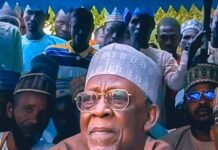Coalition success and the future of democracy in Nigeria, by Engr. Bello Gwarzo Abdullahi, FNSE
The resilience of Nigerians in the face of formidable challenges is truly remarkable and deeply entrenched in the nation’s history. This resilience has been prominently showcased in the recent surge of intensified activities within the political arena, primarily in response to the perceived lackluster performance of President Bola Ahmed Tinubu. The frustration among Nigerians, stemming from the harsh economic conditions they endure, is not merely a fleeting sentiment but a profoundly rooted feeling that permeates society. Despite the palpable discontent, the government appears to be oblivious to the tribulations faced by the populace, further exacerbating the disconnect between the ruling administration and the citizenry.
The current political landscape in Nigeria reveals a stark contrast to the initial optimism that accompanied President Bola Ahmed Tinubu’s ascension to power. The expectations of meaningful change were high, resonating with the aspirations of Nigerians for a brighter future.
However, these hopes were swiftly dashed following controversial policy decisions such as the abrupt withdrawal of fuel subsidies and the liberalization of the currency. These actions, undertaken without a comprehensive strategic framework, have significantly contributed to the myriad challenges confronting the nation today.
Moreover, the administration’s questionable appointments, pursuit of non-essential projects, and attempts to consolidate power have only intensified the prevailing issues. The preoccupation with the forthcoming elections rather than with effective governance has further polarized the political atmosphere, leaving many Nigerians disillusioned and questioning the trajectory of the country.
The disconnect between the government and the populace has catalyzed the formation of coalitions, which have become instrumental in shaping the political landscape and the future of democracy in Nigeria.
Nigeria’s ethnic, religious, cultural, and social diversities necessitate adept coalition-building to unite diverse political parties and interest groups towards a common objective. However, successful coalitions must navigate these complexities with skill and diplomacy.
READ ALSO: President Bola Tinubu: Gaps between expectations and reality, by Engr. Bello Gwarzo Abdullahi, FNSE
Looking ahead, the future of democracy in Nigeria hinges on the capacity of political parties to forge robust and effective coalitions. These coalitions will play a pivotal role in addressing the pressing issues of corruption, insecurity, and economic inequality that continue to besiege the nation.
Ultimately, the success of these coalitions will be a determining factor in shaping the trajectory of democracy in Nigeria, underscoring the importance of unity and collaboration in surmounting the challenges that lie ahead.
bgabdullahi@gmail.com
Follow the Neptune Prime channel on WhatsApp:
Do you have breaking news, interview request, opinion, suggestion, or want your event covered? Email us at neptuneprime2233@gmail.com





